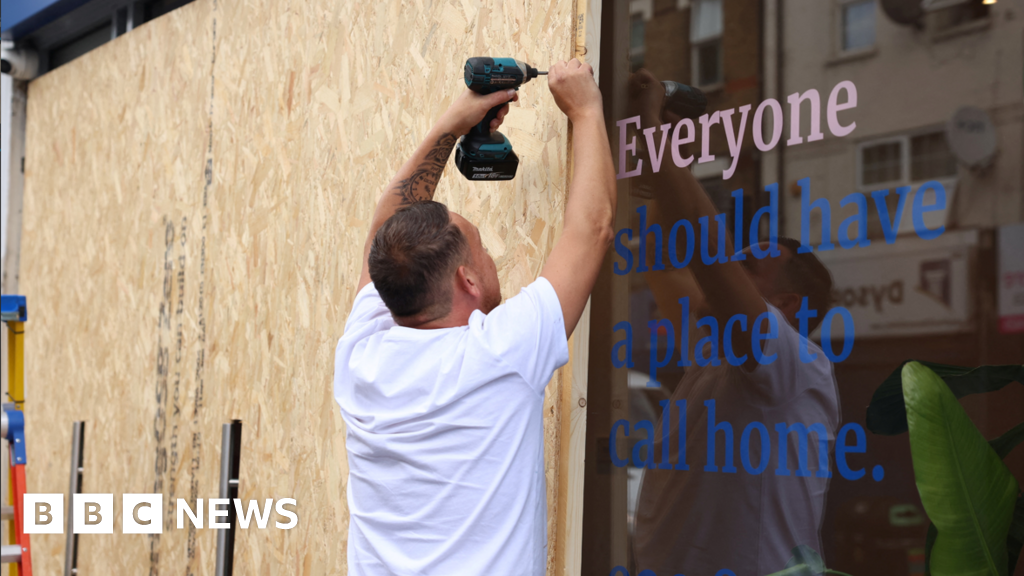 Reuters
ReutersMinisters are urging insurance firms to pay out quickly to businesses damaged by last week’s rioting.
Business Secretary Jonathan Reynolds told the BBC he had written to the Association of British Insurers (ABI) to make sure companies “receive the cover that they are entitled to through their insurance policies as swiftly as possible”.
Businesses including shops and hotels in Stockport, Liverpool, Hull, Sunderland and Belfast have seen windows or facades smashed in or set on fire by rioters while some have reported looting.
The ABI said it would “work with our members, the government, and other stakeholders, to do everything we can to help customers recover as quickly as possible”.
Mr Reynolds said that he had visited Liverpool on Friday where he spoke to some small business owners affected by the violence.
“They weren’t aware if they were insured or under insured that there was still help available to them,” he said.
So what help is available for businesses and, if you are insured, what does your policy cover?
Will my insurer pay out for business damage caused by riots?
Most commercial insurance policies will cover companies for damage to their premises caused by civil unrest. Direct Line, for example, says it “includes insurance cover for riot as standard under its business insurance policies”.
Most will also include “interruption to business operations”. This would be, for instance, if police cordoned off an area which stopped shoppers from entering a store, resulting in a loss of income for the firm.
Businesses should always check with their insurer as soon as possible to see exactly what is covered under their policy.
Owners should also report any damage to the police to get a crime reference number for a claim.
If your company is in Northern Ireland, the ABI says: “Policies will vary but malicious damage may be excluded.” It says compensation can be sought from the Department of Justice (Northern Ireland).
Meanwhile, if your vehicle has been vandalised during the riots, “most comprehensive motor insurance also includes cover for damage to your car”, according to the ABI.
I’m not insured, can I still get compensation for damage to my business?
Yes, you can – through the Riot Compensation Act (RCA).
Mr Reynolds said: “It covers damage, destruction and theft of stock from things like looting.”
You must be able to demonstrate that the damage you are claiming for is because of a riot.
If you’re not insured or underinsured, the Riot Compensation Act is a good option.
The government states that businesses have 42 days to make a claim through the RCA from the date the riot ends.
Even if you are covered – and your insurer decides not to pay out for all or part of your claim – you can apply to the RCA.
You have 42 days to make a claim from the date your insurer tells you that you’re not covered.
There are a number of things you can claim for.
If, for example, you own the building affected by a riot you can claim for damage to the structure. If you are the tenant or occupier, you can seek compensation for damaged or stolen contents.
The government also says that owners can claim for damaged or stolen business items stored in a vehicle and underinsured vehicles.
Compensation may be in money or repairs carried out by the claims authority’s expense.
Which brings us to how to claim. The claims authority is the Police and Crime Commissioner for the area where the riot took place. It is different for London details of which can be found here.
Businesses should visit the police force’s website for contact details.
The claim form itself is at the end of this government document here.
What if my insurer is taking too long to pay out?
Even though Mr Reynolds has written to the ABI, asking them to make sure insurers act quickly, the ABI is a trade association, not a regulator and therefore cannot sanction firms for dragging their feet.
Nevertheless, the ABI said: “We will be working with our members to monitor the claims process.”
However, if a business is not happy with the speed with which their claim is being dealt with, they can go through their insurance company’s complaints process.
If that still doesn’t work, customers can go to the Financial Ombudsman Service to make a complaint.

